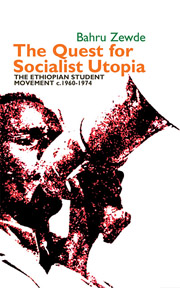Explicitly or implicitly, biographies have dominated Ethiopian historiography. Until very recently, Ethiopian history has been almost exclusively the history of the elite. As such, the reconstruction of historical events has revolved around the careers of prominent individuals. The chronicles, which go back to the fourteenth century, illustrate this to a very high degree. They were conceived to document the reigns of kings and most of them adhered strictly to this rule, giving the reader a detailed and faithfully chronological account—often day by day—of the deeds of the protagonist.
This is not of course to say that other, non-biographical, information is not to be found in these documents. On the contrary, inasmuch as the chronicler takes it as his sacred duty to record whatever had taken place during the reign of a king, he is bound to give us a lot of useful information on such, strictly speaking, non-political issues as famine, pestilence, earthquakes, trade, and—invariably—religious affairs. But such information remains essentially incidental to the main objective, which is to document the life and career of the king. Interestingly such digressions from the main story are often prefaced by the phrase, “bazihem zaman” (“During this reign”, i.e., incidentally).

